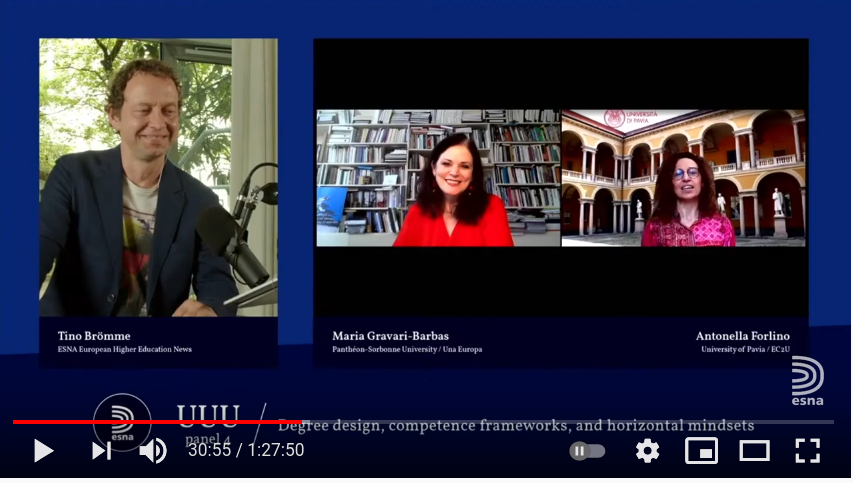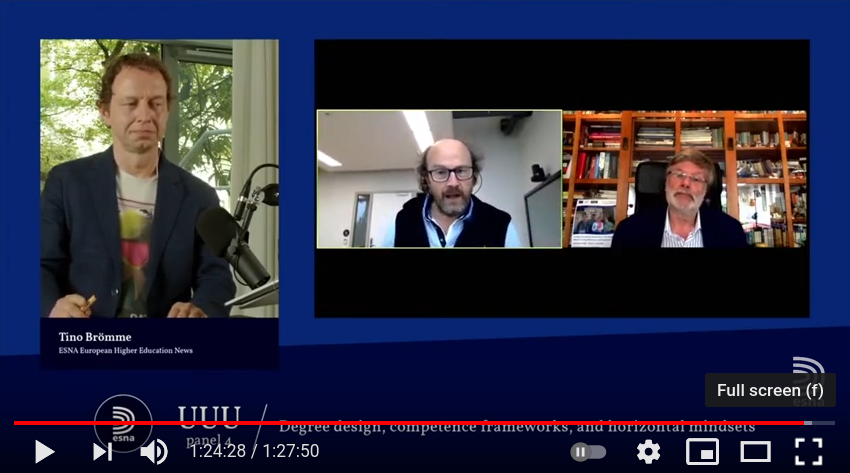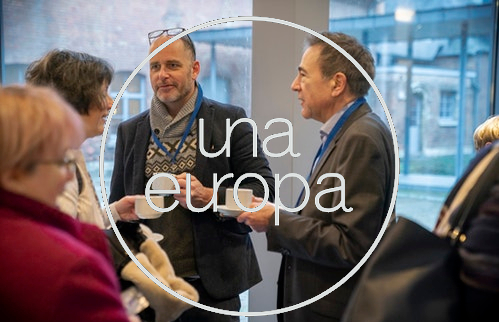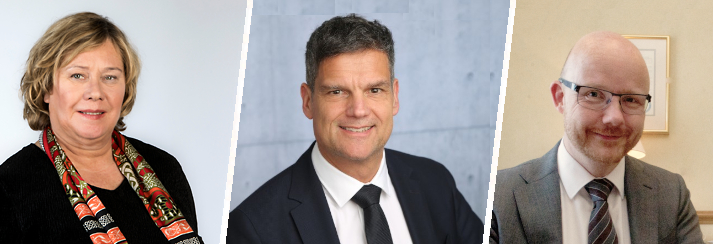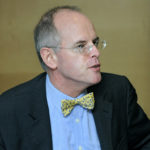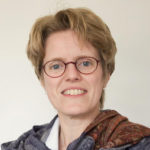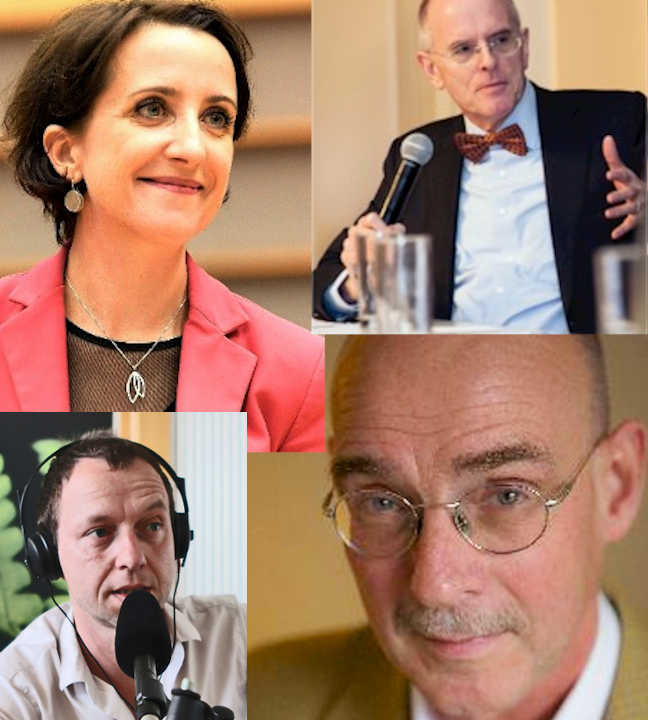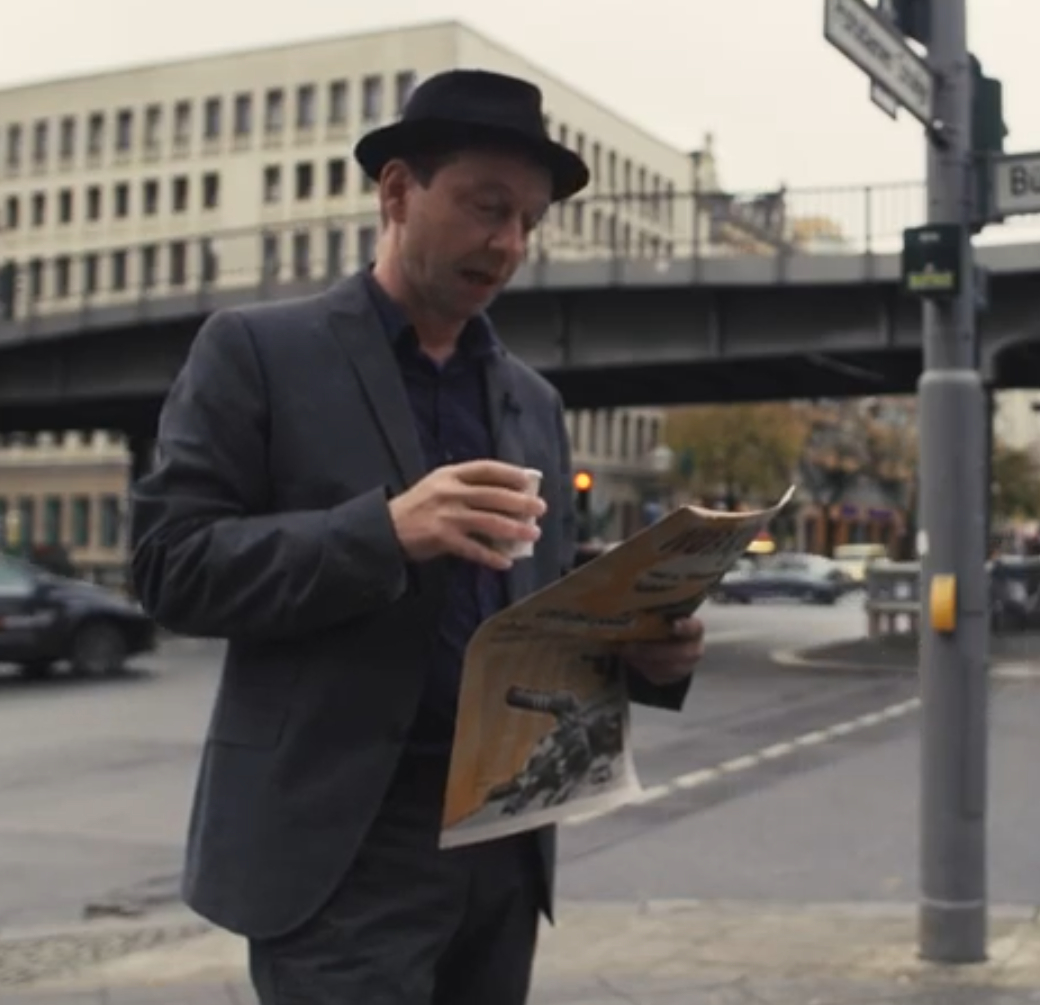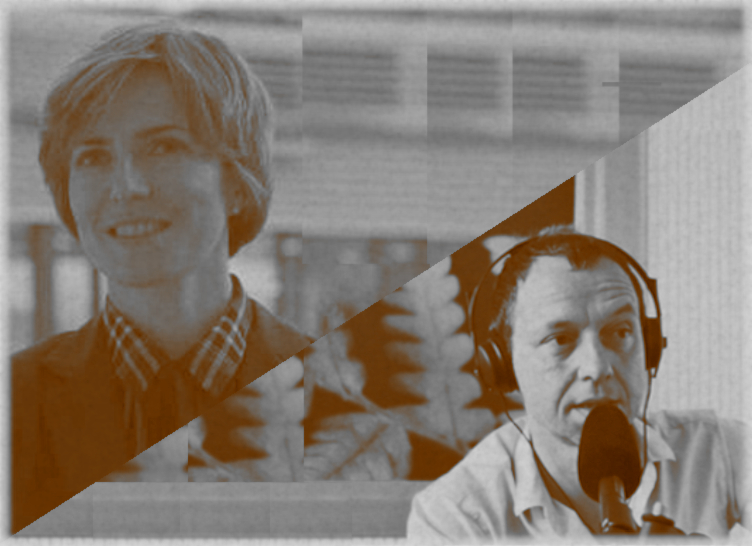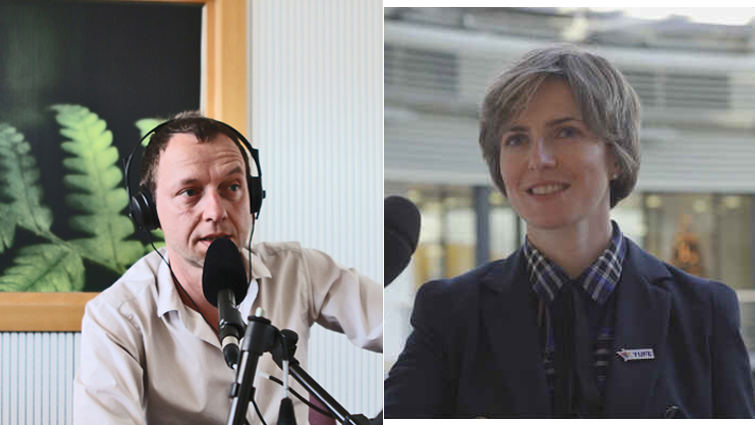Hello again. Let’s talk with our man in Brussels, the man with the bow tie, Peter van der Hijden. Peter, you are – Welcome, first of all! – you are counselling universities when they apply for funds and you write policy papers to help even the European Commission to assemble their own thoughts. One question for you before you help us understand this university policy. We have just heard the news about the Multiannual Framework Budget of the EU, and that Monsieur Larrouturou, a French MEP, is on hunger strike because he demands more money for the research and education budget. And he also demands a 0.1 % tax on stock exchange and money transfer, yes, trading of stocks and bonds, like a little contribution of the rich to the European budget. You know the European Commission so well and what goes on there. Do you know what these current debates, discussions on the budget really mean? Whose interests are conflicting there?
Peter van der Hijden It is a traditional pushing and pulling between Parliament and Council and Commission. And the Commission is ambitious also on the own income, this is a form of tax for which you gave one example of taxing the big companies of social media. The Commission is also in favour of… I’m not speaking on behalf of the Commission, I am working as an independent, but even when I worked there, it was always pushing and pulling.
The Commission is ambitious, Parliament is even more ambitious, you could say overambitious, but that’s that’s always good. And then the Council is pulling back. The Council of Ministers, they are the heads of State and government, they are responsible for the national budgets. Maybe the Education and Research Minister wants to give more to Erasmus and Horizon, but the Finance Minister does not. So it’s a pushing and pulling. It’s looking for alternative sources like the Next Generation, these Recovery Funds. It’s playing with time, you can say, well, less money now, more money in future. If something will come out, it will be more than we had before. It will be less than we had hoped for.
The last Horizon budget was 80 billion. Now, Monsieur Larrouturou wants 39 billion more for Horizon Europe and Erasmus. Sounds a lot, is this realistic? What do these numbers mean actually?
Peter van der Hijden Not the total that the Parliament wants, or this this Member of Parliament, but something will come out in the end. It’s also in the interest of the Member States, the more you invest in education and innovation, the better you come out economically later on. I think, there’s a strong awareness of that. We have the additional funds of seven hundred fifty, it is almost a doubling of the EU budget, and we must try to gear that towards topping up our education, research and innovation programmes and doing other things that have the colour and the taste of innovation. And if universities, European University Alliances, position themselves well, come with plans, I’ve always learnt: “money follows ideas”.
When we talked before, you said that the European University Initiative money – the five million that they get for three years plus the Horizon Europe two million and maybe other sources – you said, this money is a lot, but not enough really to make substantial changes. You said, “but it’s a good benchmarking exercise”. I don’t really understand what you meant by this. Can you explain?
Peter van der Hijden Well, first of all, the money – I always try to annoy my audience – the money is too much. Five million from Erasmus, two million for Horizon, to organise your modernisation. It serves not to do a lot, it serves to make plans, to put structures in place, and it’s money to meet, basically. And as you know, we cannot meet. So the money has even doubled more or less thanks to Covid, because now you can spend it on more useful things if the eligibility rules of the Commission allow you to do so. So 5 million, no, let’s say 7 million – that’s what the Commissioner says, because she’s responsible for every Erasmus and Horizon – 7 million to talk with your six partners about getting your house in order? That’s a lot, that’s a lot. You cannot run a faculty for seven million, but you can prepare the plans. The real money, of course, will then have to come from other sources, the rest of Horizon, the European Structural and Investment Funds, meaning that our colleagues in the poorer regions of Europe are the rich members of the European University Alliances, because they can really build new campuses with the structural funds money.
And as I said before, we have the 750 billion of Ursula von der Leyen, of Charles Michel, the Council and the Commission, which they now desperately are looking for meaningful ways to spend. So I would not worry about the money, I would worry about the ideas. Make sure that you have very good ideas and those you can learn from the benchmarking. That was your question. If you sit together on the Alliance of seven, one has the best library, one has the best HR, one has the best incentive system for staff, one has the smoothest student admission. Well, after three years, after five years, I would expect all seven to be as good as the best one in the group. And that is a very important task of the European Universities: benchmarking, next to the fact, that they are supposed to integrate part of their missions, not all their missions, but part of. So that’s the double assignments, get your act together, modernise and do some integration.
Well, Peter, thank you so far. I think we are now opening up to our other two guests, Vanessa Debiais-Sainton and Kees Kouwenaar. Are you with us? Madame Debiais-Sainton is the head of the Higher Education Unit at the European Commission. She studied Chemical Engineering and also worked for chemical companies before she went into the European Commission. Tomorrow she will gather all the rectors of the University Alliances for a big meeting because the second batch of 24 more university alliances have been recently selected. And our second partner in the second half of our debate is Kees Kouwenaar, he’s an expert of internationalisation because he works there for a long time. He’s Secretary General of the AURORA Alliance, also a new university alliance. He graduated in history and he worked for Nuffic, a kind of Dutch British Council. He lives in Amsterdam and loves cycling with his wife. Madame Debiais-Sainton, bon jour! You are now speaking from and for the European Commission. Maybe it’s interesting for the listeners to understand how this works. The European Commission executes what the European governments want. And you told me that this European University Initiative was something – after Macron presented it in his speech in the Sorbonne in 2017, maybe it was the idea of his wife Brigitte – you told me that this special thing about this Alliance were that there are a bottom-up initiative. So that would mean that the university sector, the people in the universities, shaped the programme, helped shaping the programme, too. Can you a little bit explain, how this mechanism works and where we are now?
Vanessa Debias-Sainton Yes, thank you very much for your question, Tino. So indeed, everything started with the speech of Emmanuel Macron to create these European Universities. And of course, everybody was very pleased that suddenly education becomes very high on the political agenda. This had not been the case for for many years. At the same time, the wide and diverse higher education community were wondering what it is because all the universities are European somehow. So then we gathered diverse experts from the higher education community, with many networks, AURORA and the Coimbra Group where part of these stakeholders. We started to co-create this new initiative together. To say look, we have an opportunity, let’s take it to do things that we have always dreamed to do, but we never had the resources or the funding to do it. So we started together dreaming. And at the beginning we dreamt in very different directions, as you can imagine, because we have a very diverse landscape in Europe with a very diverse audience. But then the longer term we looked, the more convergent the ideas were, and this is how we came up together with this concept of European Universities, which aims not to do what we always do now, which we are aiming at doing what is not happening yet.
And I was very pleased by listening to Ludovic and Daniela before, they gave very good examples of what these European Universities are about. First, this is not a European project. You know that you give funding for three years and then you are lucky when it continues, but in many cases, they cannot continue. Here it’s not a project, it’s a long term initiative. What we have been asking them is to dream about the universities of the future, what they want to be together. So an alliance of about seven higher education institutions from all parts of Europe, what they want to become in 10, 20 years time. The novelty already and impact in between, and one of the previous questions, was what is really the international impact? What we are seeing in these partnerships, is that already it has created new partnerships. Because before, if you looked at the mapping, the international cooperation was very much either Western-centred or Eastern-centred. But we didn’t have really strong partnerships bringing north and south and Eastern and Western partners together. So that’s already one transformational aspect. The second one, as Ludovic and Daniela explained before, is really to transform the way we teach and the way we learn. And this has even more accelerated with the Covid-19, moving all the learning teaching activities online. No one was prepared for such a change so quickly. And what we have learnt from the European University is that more than 96% of universities think that, actually, if European Universities would have already been in place, they would have been much better prepared for this pandemic. They are setting up entire university campuses, meaning that a student in Berlin will not only have access to the courses of a Berlin university, but they will have access to the courses of the other partners across Europe. So it’s really a huge benefit. So in terms of impact, it has a huge leverage impact when it comes to mobility, whether it is physical and virtual or blended, because here we are addressing the full population of the students at these universities. And it has a huge leverage in terms of the structural and transformational impact in these universities to really transform the way we teach and the way they learn and the way they do research. Because, as Ludovic explained very well, we are speaking about the “Knowledge Square,” meaning that here we are looking at a [00:48:05]transformation of the four different missions [1.3s] of universities, i.e. education, research, innovation and service to society.
Let me ask here, this is interesting. One of our viewers has a question that I also had. In the beginning there has been the question of how these university alliances should be shaped. Some were more tending toward an élite model like the Ivy League in America. And some were more tending to do something on the broad scale, as it is now, with 280 universities participating, that is one in 11 in the European Union and one in 14 and all over Europe. So for now, you have a very broad programme. However, the question here is, is this University Alliance Initiative something like the German Excellency Initiative, something that wants to create special universities that have more money and who leave the others behind?
Vanessa Debias-Sainton When the objective that has been set up by by the head of State, heads of governments and also with their ministers responsible for higher education was to have an initiative that is as inclusive as possible. Inclusive in terms of geographical balance, meaning that all the Member States should be part of it. Inclusive in terms of the types of higher education institutions, so not only top research leading universities, but also universities of applied sciences, for example, and inclusive in terms of the accessibility to a wide range of students. But this inclusivity doesn’t mean that they are not excellent. It all depends how you define excellence. It’s excellence, not only in top of research, it’s excellence in the way you deliver teaching and learning, the way you’re going to set in place completely new innovative pedagogies, in the way you’re going to involve all the, as Ludovic explained before, all your surrounding innovation ecosystem, working together with the cities, with the regions, with the surrounding companies. And we believe that inclusion and excellence are the two aspects of the same coin and that they are reinforcing each other.
There’s even another question which is very interesting from our viewers. Anonymous says: given the current discussion on migration, climate change, et cetera, does it make sense to have a European university? What is so specific about it?
Vanessa Debias-Sainton All these European Universities, what is their strategy for the future? On which subjects do they want to train their students? Not only some topics, but how they’re going to implement this challenge-based approach? Meaning that one of the transformations is, of course, to train students on very specific disciplines and to develop an expertise for each of them, but to go even beyond that so that they are able together as students from different disciplines with different expertise, to be able to work together on big challenges like climate change. Many of them amongst the 41 universities have ‘sustainable development’ and ‘tackling climate change’ at the core of the strategy, meaning that they will have students from different disciplines that will work with academics, with researchers, with the cities, with the regions, with the companies to tackle very concrete challenges that their cities or their regions are facing. We also – because we can just send the question many different ways – it could be that travelling etc. isn’t good for the climate. So this is why we are also developing a Green future Erasmus programme, meaning that we will support and we will encourage a greener transport when it comes to mobility. But we’re also going to support some blended mobility. So it means shorter physical mobility, blended with virtual mobility. So all this will contribute to preserve the climate. A third element as well will be that – you know, so far to organise the mobility, we used a lot of people – now, this is something of the past with the European Student Card Initiative. We are aiming at utilising all the process to organise the mobility, by allowing these interoperability between all the diversity of I.T. systems of universities across Europe so that all these systems would be able to speak to each other. And this is what the ‘ERASMUS+ without people project’ is aming at.
Well, I need 15 more of these debates to clear this up! Let me switch for a moment to Kees Kouwenaar who is joining us from Amsterdam and who is the secretary general, the coordinator of the AURORA Initiative. AURORA has all of these key words also in their project description. Mr Kouwenaar, you are an expert of internationalisation. I like the project description AURORA a lot. What would you say in one sentence, what is the unique aspect of your alliance?
Kees Kouwenaar I need to speak in one sentence about the network before I move to the alliance. AURORA was founded in 2016. So before President Macron’s speech to actually do very similar things as we are now in the whole idea of the European University Initiative, we were founded as a group of universities who came together to help each other to become better at what they want to be good at. And for AURORA universities, this means better at matching academic excellence with societal relevance. It’s a group of universities that fights the idea that academic excellence and societal relevance are each other’s enemies.
And international collaboration in AURORA has never been an objective per se. It is a tool to that end, not a separate objective. It is a high trust network which allows universities to openly talk about their weaknesses and their challenges in a way they feel they cannot do that with their domestic competitors. And this will not change with the alliance. But the core of the Alliance programme is that we say, we need to equip our students, our graduates, with not only the academic and the subject-specific knowledge, but with the skills and the horizontal mindsets to help them to be able and willing to address the big challenges in society. And the key tool in our alliance programme is what we call the AURORA Competence Framework. It is based on the analysis that in higher education at large, in our universities, in Europe, in the world, we are still not good enough in finding a clear expression in how good our students need to be when they graduate, not just in chemistry or history, but also in critical thinking, in group work, in enquiry and analysis, in taking risks. And this framework will develop a set of expressions which academics can choose from to build these horizontal learning outcomes into their curricula across the AURORA universities, and any other university that would like to use them, to create a language, a common language and a common toolbox for learning outcomes in horizontal competencies. So that’s that’s what we are all about.
I remember, when Macron held his speech, his definition of these European Universities was more vague. But one thing he said, it was the multilingual aspect. He wanted students to learn at least two extra languages. I didn’t look it up, but I want to know, has AURORA an answer to the language question?
Kees Kouwenaar It is our task team 3.3.2, which is called “Plurilingual Languages”. When writing the proposal, I have learnt that there is a major conceptual difference between plurilingualism and multilingualism. We have a group that is developing all kinds of tools to help our students to develop their competence, their plurilingual competence, not only in the second, but also in a third European language. Yes.
So I suppose there are language courses included in the other mobility programmes, or how does it work?
Kees Kouwenaar I don’t understand that question, can you repeat?
Well, if I am a student now in your network and I am participating in a course or in an activity that the AURORA network offers, I am now speaking one other language and perhaps I would need another one. Practically, do you know how the network wants to implement multilingualism or polylingualism in their activities?
Kees Kouwenaar It is an excellent question and the honest answer is no. Actually, the Alliance has officially started this week, first of November. Tomorrow and the day after, we have our launching virtual meeting with many of the task teams. Plurilignalusm is not one of them, but they are now going to make their plans to create tools for the universities to give students opportunities to learn languages. But let me underline, the core of our alliance programme is not focussed on moving bodies. The core of our alliance is to give all the nine universities the tools to improve the education, the teaching and learning processes within their universities. And that also includes international mobility, but it includes more than mobility. The focus is making the normal education better in all our universities.
I would ask you a policy question, because you were talking about the learning outcomes before, as a measurement of success or of advancement. The European programme for these University Alliances has evolved. There was the first call, there was a second call, in which you were successful with your alliance, and it will evolve further. What what are your proposals for the further development of this programme? What should be in there, what’s not in yet, or how should it be better?
Kees Kouwenaar I think, Peter van der Hijden once told me, that the European Commission is, of course, at the end of the day more interested in supporting the domestic regional improvement of higher education in its own context, than in the transnational cooperation, which is always a small outer skill for all of the universities. But because of their position, they have to focus strongly on the transnational dimension because that is their given political role. I would like to argue that in the further development of these cooperations, these European University Initiatives, we keep our main focus on helping our universities to serve their community as well as they possibly can at city level, regional level, national level, European level and global level, and not put all our eggs in the basket of the transnational European dimension. It is it should flow from the national and the natural objectives of the universities and not be positioned as a priority. It can be made a priority for the administrators, for directors. It will never become a priority for the academics who want to go on doing what they are self-motivated for.
And this is the point where I would like to return to Vanessa Debiais-Sainton for a moment, because, in fact, this question before about the European identity and dimension demands it. Can you say something about this programme? How it reaches out – so that we are not so Eurocentric all the time – to countries and universities beyond the European Union? Can you specify on this how far the programme does it? I know Istanbul is in England, but how does this programme go further than the European Union?
Vanessa Debias-Sainton Well, so far, the initiative is open to discuss the Erasmus+ programme countries, so 33 other countries, including those that you mentioned, we were very happy to welcome Norway, Iceland, Turkey, even Serbia. So this is the current scope of this initiative. Now, you know that we have announced that we are going to roll out this initiative under the next MFF. And so with the next Erasmus programme in synergy with the Horizon Europe and and other European programmes. Then, the scope will be discussed once more time with the Member States. But in the meantime, each of these universities, we have currently more than 284 higher education institutions involved in these 41 European Universities. Each of them have their own network with whom they cooperate not only within Europe, but also beyond. And it’s obvious that all their partners beyond Europe will benefit from this alliance because they will benefit from the transformation that they are going to put in place, which means that also the staff, the researchers, the students who will cooperate with them will not only cooperate with the university of Berlin, but they will cooperate with all the partners from European University where Berlin University is involved, for example. So it completely changed their perspective. And they are very much looking at it with a lot of interest. We know already that many universities beyond Europe would like to see how they could be even more involved in this initiative. But of course, this is not the decision of the Commission. This is a decision to be taken with the Member States.
Maybe I should make an inquiry on the how the universities in South America and in Africa perceive this initiative and after a few years, we ask how much they have been involved. This would be really interesting. Peter van der Hijden, I see you’re keen on intervening with with some critical questions, what were your thoughts while we were talking with Mrs. Debiais-Sainton and Kees Kouwenaar so far?
Vanessa Debias-Sainton You’re muted, Peter.
Peter van der Hijden I listened to Vanessa and Kees, and also to Daniela and Ludovic. You see this interesting tension or not a tension, it’s a combination of things, it is both big and small, nitty-gritty. European Universities are for the big boys and girls, the big shots, and it’s for the staff and the students. Why is it big? Why is it interesting for presidents and rectors? – Because as Daniela said, it’s not a project, it’s a transformation of your university through the participation in an alliance. Very different animal, it’s an immediate organisation, an alliance, it is doing things, it’s not only talking.
That’s why the President comes in, in German it’s called “Chef”, so it’s a “Chefsache”, something for the prime minister or for the rector or for the president. Why? Because it’s geopolitical, in the big sense. It’s positioning Europe in the world. Can we come out stronger? It’s positioning your university in your region. And what alliance should you join to position yourself now and in the future? That’s for the for the big boys. For the staff members it is also relevant because they are the professionals that run the alliance. Every alliance has 30, 40 staff teams. Kees Kouwenaar was mentioning that the staff teams were going to meet. And those are the professionals that make the change. Directors of Studies, Library Deputies, H.R. Officials, Student Admission Specialists. They will make the student admission system of AURORA work. Or the H.R. mobility scheme of YUFE. Thanks to those people, thanks to Vanessa, thanks to Macron, they have a career in the European perspective. Of course, most of them will stay home, but some will do secondment or even pursue their career at the partner institution. That makes it interesting for the big boys and for the workers on the floor.
Now, my question is to the panel and to all of us in the coming year, is this enough? Is this enough to substantially – and now let’s use the names of our alliances – re-YUFE-nate our high education? Is a substantial enough to ENGAGE, to ENHANCE, to ENLIGHT? And maybe even to CHARM? And can our systems really become better this bottom-up way? – I think they can. The benchmarking is important, but I would like to leave two ideas on the table. One is: rotating grants. We now have 41 grants for 41 alliances. We are already building themselves up like trade unions who get more money after. But I would say, well, let’s make it a rotating grant and invite new ones or kick out one third and get one third new in, because we don’t have the Fachhochschule in the alliances, the schools of applied sciences. We miss the military academies. We miss a number of what I call “system relevant institutions” that could also benefit from the blessings, or the curse, of being a European University Alliance. So that’s one idea of rotating grants not for tomorrow, but for the year to come to think about. And the second one, we should explore the Swiss question. The Swiss question is that Switzerland has good education, higher education in all cantons, in most of them, but they have two universitys that stand out, it’s EPFL in Lausanne and ETH in Zurich. (…sound problems…)
Mr. Kouwenaar, what is your reaction to these many ideas of Peter van der Hijden?
Kees Kouwenaar (1 minute of sound missing) … As for the Swiss university system with two particilarly high ranking institutions. This is a policy, making one or two single high peaks by carving out the valleys among them, because then you would lower the average quality. But that’s one thing.
The other comment that I have, I think, it relates to what you say in some way, citing an Israeli historian, Yuval Harari, one of many who said, reality is in narrative, universities do not exist, universities are simply narratives that exist as long as we are convinced that the narrative has some value and some merit. But universities are very different narratives to very different groups. The university narrative for academics, for researchers, for teachers, for students, for administrators, for leaders, for alumni, for external stakeholders are vastly different narratives. The European University Alliance, and that’s my bridge to what you say, will become a paradigm changing development, like Erasmus was in 1987 and Bologna was 10 years later, only if there is enough conviction in the various distinct narratives for these groups of stakeholders to carry on the burden themselves. I am in favour of a rotating fund. I think the European University Alliance, the Erasmus, the AURORA Alliance cannot depend on Brussels money. It can only succeed if there is enough intrinsic motivation, not just with the rector or the administrators, but with the academics and the students. And it must be something that we do because we want to do it ourselves. The commission gives us some support to help us do what we want to do ourselves anyway. That’s the only way forward.
I would like as a question also to Mme. Debiais-Sainton. Is there also a perception in the European Commission that these European University Alliances Initiative is a further step? Is it like a natural further step after ERASMUS, after the Bologna process, like a historical and further development of the way European universities and European higher education is evolving? Is there an idea of this like a progress that now must enter into these university alliances, Mme. Debiais-Sainton? How is the idea in the European Commission about this?
Vanessa Debias-Sainton Yes, absolutely. That’s exactly the way we see it. In international cooperation, you start generally with mobility (… sond missing …) the strategic partnership. Then a little bit more ambitious, you have ERASMUS MUNDUS and you have the knowledge alliances. Then very, very ambitious, the most ambitious, which has never existed before, are the European Universities. And we have a lot of ambition with this initiative, not only to transform the way the higher education landscape in diverse higher education landscape – as Peter and Kees explained – but also to make it a reality.
Here I come back today to the question of Peter to make it a reality where we need all these universities. Of course, we need the support of their national governments and they then we need the support of the European Commission. How? Because, of course, they we need not only all the top leaders of these universities to be on board, but also all the students and staff, because as Peter said, rightly so, they are the ones who will basically implement all the activities. But we need as well to continue to implement even further the Bologna Process. For example, when it comes to accreditation or quality assurance, we are not there. And this is why we see this initiative as a catalyst for change. This is why we will meet tomorrow directors and coordinators of European universities together with the directors general responsible for higher education. How can we make quality assurance and accreditation more fit for purpose, more modern to meet, you know, the objective of these European Universities? What the heads of States and Emmanuel Macron asked us, is to create a European Degree that does not exist now. We need to co-create it together. And the European Universities told us that when putting resources, data, infrastructure together, they need a specific legal statute. So we’re going to explore together with them a European legal statute for them. And we are also looking at, you know, the (…) Covid-19 crisis. The labour market transformation is accelerating even more than before when it comes to the digital and the green transition. So we need to skill and reskill the labour workforce and the world of higher education is absolutely key. So we’re working as well to (… sound missing …) So all this requires a lot of ambition, a lot of vision at European, national and institutional level. The road will be bumpy, but altogether I’m convinced that we can make it. So this is our vision for the future that we have expressed in our recent communication “Achieving our European Education Area by 2025” and with “Digital Education Action Plan” to support as well the European university institutions.
Well, thank you for this overview. In fact, I would like to slowly close the debate and thank you all for your participation. I would like to say something about the historical dimension of this thing. One of my historical heroes actually comes from the city of Daniela Trani, from Naples. It’s Federico II, King of Sicily and of Germany in the early 13th century. He was the first to found a non-religious university, a university independent from the Pope, his great adversary in 1224. This university was, if I’m not wrong, the 12th university in Europe. Before it, there were Bologna and Paris, of course, and they were all dominated by the Pope. Federico’s monarchy was the most advanced and well organised of his time. And why? Because he had a well-trained administration and he wanted to further this good policy by building this first laic university in Naples. Well, I have a feeling that these European University Alliances could be examples and could work out models that help all the other universities that are not in the alliances, too.
I am very optimistic that there will be many interesting news to tell about their projects, models and initiatives. And I hope we can be part of it with this conversational format. I want to thank you all for the participation today. We have read the most interesting and highest rated questions from Slido. I thank also the participants from the wider audience who are on YouTube. See you again in December. Good day and good luck for everybody. Thank you for watching!



